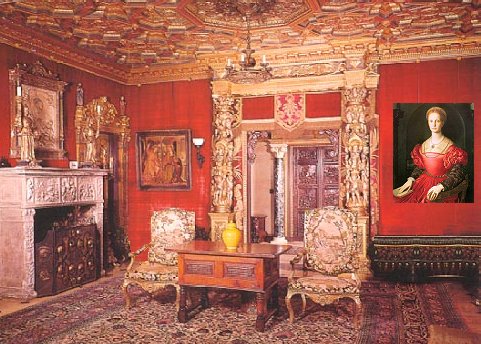
If you visualize the portrait as hanging in a sitting room, you have chosen a much smaller and more personal space than either the gallery or the staircase. I'll make this analysis relatively short, because I know the red background is a bit hard on the eyes, but doesn't it look lovely with this particular room?
Here, you get the feeling that the Duke has taken the envoy into something of a private sanctuary. It would be here that he would be likely keep his favorite art works, if not the finest and most impressive pieces--those would probably be reserved for his palace's public areas. If the bronze seahorse is in here, I suspect it's a statuette rather than a large, full-sized statue.

Even though I've made the Duchess's painting the largest art object in the room, it's still a smaller portrait than the huge monsters that dominated the gallery and staircase. There's a more intimate feel, both to the size and style of the portrait itself and to its setting. The Duke and the envoy are having a very private conversation, where they are unlikely to be interrupted. This probably means the Duke is doing some more serious negotiating, pressing his advantage.
The pointed remark about how "The Count your master's known munificence/Is ample warrant that no just pretence/Of mine for dowry will be disallowed" (49-51) takes on a more official note in this situation. The word "warrant" makes it sound like a legal transaction, with the Count's reputation for generosity or "munificence" being thrown on the bargaining table as a pledge. Yet the Duke implies he will not take advantage, asking for nothing beyond a "just pretence" or a fair and just sum.
Of course the Duke would never stoop to arguing, but perhaps the envoy has not been as easy to persuade as he might like--this is at least the second time he has had to make the dowry remark (line 48 concludes with the words "I repeat"). He covers it up quickly by saying "Though his [the Count's] fair daughter's self, as I avowed/At starting, is my object" (53-54). But the dowry is clearly a concern.
By inviting the envoy into the private area of the house, the Duke has turned an official negotiation into a social encounter. It is a lot harder to say "no" when somebody is acting as a friendly host and is telling you his secrets--like the one about what happened to the last Duchess.
Want to return to the page on the dramatic monologue?